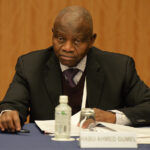By Angela Atabo
Experts in the pipeline sector have called for the establishment of a national pipeline framework and an integrated digital command and control centre to secure Nigeria’s energy assets.
They made the call at the 2025 Nigerian International Pipeline Technology and Security Conference (NIPITECS) with the theme “Building Robust Pipeline Systems for the Decade of Gas and Beyond”.
Mr Adeche Omotosho-Oboro, Managing Director and Chief Executive of Umugini Pipeline Infrastructure Limited, described pipelines as the “arteries of the Nigerian economy.
Omotosho-Oboro, while speaking on the topic “Pipeline Security and Surveillance: An Integrated Approach” said that the country’s energy infrastructure should be treated as a critical lifeline rather than isolated company assets.
“Pipelines are the arteries of the economy. Just as the heart cannot function without arteries, our economy cannot thrive without an integrated and secured pipeline network.
“Our economy is driven basically on that. Yet, vandalism, sabotage, theft, environmental degradation and all that, affect this vital infrastructure.
“This is not a technical fault anymore. It is a wound to our economy, our environment and our national pride. We lose millions of dollars.
“That is why it is very important that there should be a national framework concerning pipelines,” he said.
Omotosho-Oboro decried the rising cases of pipeline vandalism, crude theft, and environmental degradation, describing them as “a wound to the economy, the environment, and our national pride.”
He noted that while Nigeria loses millions of dollars annually to such criminal acts, responses have remained fragmented and largely reactive.
He proposed a technology-driven solution integrating Internet of Things (IoT) sensors, satellite imaging, drones, and deep patrol systems for real-time surveillance and early threat detection.
Omotosho–Oboro lamented that the nation’s pipeline system remained fragmented, with companies operating in silos rather than within a unified national framework.
According to him, this lack of coordination has hampered efficiency, transparency, and security across the value chain.
“The network cannot work unless it is integrated. We need a centralised processing and surveillance centre that gives real-time data across locations powered by artificial intelligence and analytics,” he explained.
Omotosho-Oboro stressed the need for collaboration and trust among industry players, government agencies, and host communities, as the “human element” essential for success.
He also called for the review of outdated pipeline protection laws and the creation of incentives for homegrown fiber, cable, and surveillance technology industries.
According to Omotosho-Oboro, securing pipelines equates to securing the nation’s economic future, urging a shift from vulnerability to resilience through innovation and collaboration.
Also speaking, Prof. Sadiq Abubakar, the President of the Council for the Regulation of Engineering in Nigeria (COREN), said Nigeria’s “Decade of Gas” initiative depended on reliable monitoring and enforcement.
Abubakar, represented by Prof. Baba Jibril El-Yakubu, a Professor of Chemical Engineering at Ahmadu Bello University (ABU), spoke on the topic “Building Robust Pipeline Systems for the Decade of Gas: The Role of Engineering Regulations and Enforcement”.
To strengthen the gas process, Abubakar said there was need to strengthen enforcement by establishing a Joint Technical Committee, conduct regular engineering audits and implement Pipeline Integrity Management Systems (PIMS).
He added that there was need to improve data transparency and capacity building, enforce sanctions and offer incentives among others.
The COREN president also called for local capacity development and ECOWAS regulatory harmonisation.
“The Decade of Gas is both an opportunity and a challenge. Robust regulation and enforcement are key to success; also crucial is synergy among stakeholders.
In a keynote address, Dr Ed Ubong, Coordinating Director of Nigeria’s Decade of Gas, said the initiative represented a deliberate national effort to turn Nigeria’s vast natural gas reserves into a catalyst for industrialisation, job creation, and economic diversification.
Ubong, represented by the Team Lead, Principles, Decade of Gas office, Ramatu Abdulwahab, said the goal is to transform natural gas from a resource of promise into a driver of national development.
He explained that without adequate pipeline connectivity, gas production would remain stranded, industries would be under-supplied, and Nigeria’s ambition for energy-led industrialisation would remain out of reach.
He noted that success would depend on the strength, resilience, and reliability of the country’s pipeline infrastructure as they link upstream production fields to processing plants, power stations, industries, and export terminals, creating the arteries that distribute gas efficiently across the nation.
Highlighting ongoing efforts, Ubong revealed that the Decade of Gas Secretariat has identified 20 priority gas projects capable of unlocking 4.6 billion cubic feet (BCF) of incremental supply.
Among the critical infrastructure projects under close monitoring, he mentioned the Ajaokuta-Kaduna-Kano (AKK) Gas Pipeline, which will enable gas supply to northern Nigeria, as well as the OB3 and Escravos–Lagos Pipeline System (ELPS) expansion projects.
Looking beyond 2030, Ubong called for a vision of a fully integrated regional gas network, linking domestic supply to neighboring markets across West and North Africa. (NAN)(www.nannews.ng)
Edited by Rotimi Ijikanmi











